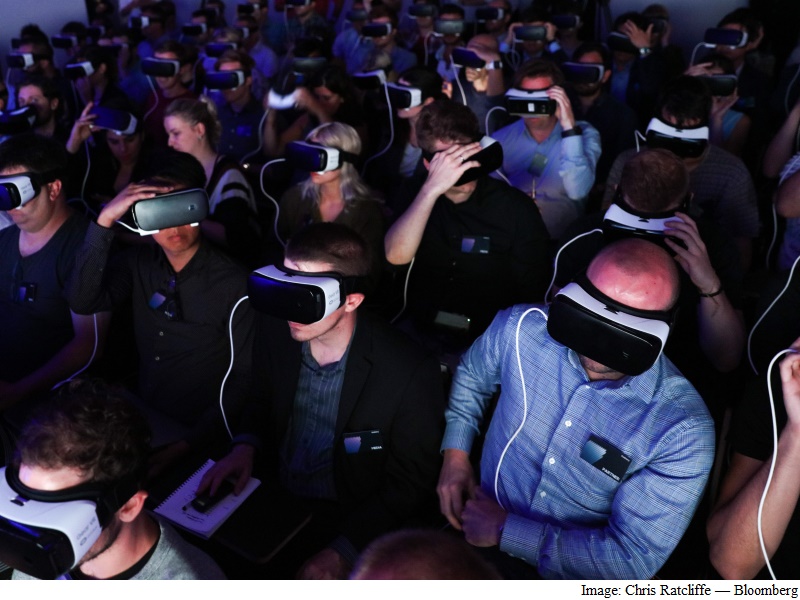- Home
- Wearables
- Wearables News
- Samsung Uses Rio 2016 Olympics to Break VR Content Conundrum
Samsung Uses Rio 2016 Olympics to Break VR Content Conundrum

The Korean electronics company has partnered with Comcast's NBCUniversal and the Olympic Broadcasting Services to distribute the first VR Olympic broadcast of select events - including the opening and closing ceremonies, diving, basketball, track and field, and gymnastics.
VR is seen by many - like Facebook Chief Executive Officer Mark Zuckerberg - as the future of tech. It's expected to change everything from gaming, to sports to communication and how people work.
The technology is still in its nascent stages, however, and no one has quite figured out how to make money from it yet. Samsung's investment is training before the Winter Olympics come to its home turf in PyeongChang, South Korea, in 2018.
In some ways, Brazil is the perfect testing ground: The Olympics have historically been a showcase for new technologies - the Los Angeles Games introduced email to a wider audience in 1984 and Seiko debuted its Quartz timing system in Tokyo in 1964, according to the book Olympic Turnaround by Michael Payne.
"It makes sense for Samsung to get as much early experience with the technology as possible so that it can try to take the lead," said Morningstar analyst Dan Baker. "Being ahead on the technology curve allows for better returns and profitability."
But Samsung, which has been a top-level Olympic sponsor since 1998, faces a lot of hurdles.
While the Suwon-based company has exclusive VR rights through NBC to the 2016 games, only about 80 hours out of the 6,700 hours of programming will be broadcast with the technology. And they'll air a day later. What's more, viewers will need Samsung's Gear VR headset ($100), a Samsung Galaxy smartphone (about $850), a cable subscription and the NBC Sports app.
(Also see: Olympics Offers Showcase for Tech Such as VR, Payments Ring)
Residents of Brazil, where the games will be broadcast by media conglomerate Globo, will not have access to NBC's VR video. Samsung's push to proselytize VR on the ground in Brazil includes 13 so-called Galaxy Studios - including one on the beach in Copacabana - at which Olympic tourists can try out, and hopefully get hooked on, the tech.
The experience of VR is unlike anything most people have felt before. Your feet on the ground and air conditioning blasting your skin are the only reminders that you're not actually standing on the track as Usain Bolt dashes past, the 360-degree view making it necessary to physically turn your head as he sprints toward the finish line and the crowd cheers.
Samsung has turned to VR technology amid a slowdown in high-end smartphone growth. With competitors like Apple Inc. getting into VR and the related augmented reality field, Samsung hopes its high-profile Olympic investment will put it in a sweet spot if consumer attention shifts and VR becomes a major source of growth.
"The Olympics will give extra momentum for virtual reality," Mario Laffitte, Samsung's Latin America vice-president of marketing and corporate affairs, said in an interview in Sao Paulo. "Virtual reality is really having a big wave right now."
Samsung faces a Catch-22 in building up its VR prowess: With only about 1 million active monthly users, it needs to build a larger Gear VR audience to be able to develop content, but it can't attract more viewers without a lot of good content to begin with. Publicity from a high-profile Olympics can help do both. This same conundrum applies to ad revenue: Advertisers want to make sure enough people will see their content to make an investment in a new technology.
"Initiatives like the Olympics and the NBA are designed to kick-start the process," Morningstar's Baker said.
Even if the content is enticing, the technology itself still has obstacles. Early stage users have complained about everything from overheated phones to motion sickness. And the jaw-dropping sensation of VR sets high expectations. While the image quality is good, it has a grainy quality to it reminiscent of the early days of television. It's not up to the level of HD TV, which is so clear you'll see every drop of sweat on the basketball players' faces. And then there's the hardware itself. People don't really like the bulky, space-age goggles, but for now that's all there is.
"We're in the brick cellphone stage of hardware," said Brad Allen, Executive Chairman of NextVR, which broadcasts live events in VR. "When you have some cool-looking glasses and they're lightweight, you're going to put them on and never look back."
Another problem with VR now is that it eliminates much of the social interacting that makes watching sports so much fun. Think Super Bowl parties. Putting on a pair of VR goggles isolates the viewer intentionally -- which is what makes it great for gaming. But it doesn't necessarily mix with the congenial atmosphere of a family or friends enjoying the 100-meter dash or watching Michael Phelps make Olympic history.
With a VR headset on, you find yourself turning left and right frantically, mouth agape. And while the people around you can see you -- and, inevitably, make fun of your gesticulations -- you have no way of seeing or hearing them.
"My wife doesn't care [about golf], so that's probably fine, but watching football with my buddies, I wouldn't go VR," said Derek Belch, CEO of sports VR company STRIVR.
While Samsung and NBC might be hoping to get into the history books for their contribution to technological breakthroughs at the Rio Games, regular television isn't ready to cede it's place just yet.
"I think we're a long way off from TV relinquishing its dominant position in how people consume the Games," says Gary Zenkel, president of NBC Olympics. "However, it's likely that as the VR marketplace grows so will the VR coverage."
© 2016 Bloomberg L.P.
Catch the latest from the Consumer Electronics Show on Gadgets 360, at our CES 2026 hub.
Related Stories
- Samsung Galaxy Unpacked 2025
- ChatGPT
- Redmi Note 14 Pro+
- iPhone 16
- Apple Vision Pro
- Oneplus 12
- OnePlus Nord CE 3 Lite 5G
- iPhone 13
- Xiaomi 14 Pro
- Oppo Find N3
- Tecno Spark Go (2023)
- Realme V30
- Best Phones Under 25000
- Samsung Galaxy S24 Series
- Cryptocurrency
- iQoo 12
- Samsung Galaxy S24 Ultra
- Giottus
- Samsung Galaxy Z Flip 5
- Apple 'Scary Fast'
- Housefull 5
- GoPro Hero 12 Black Review
- Invincible Season 2
- JioGlass
- HD Ready TV
- Laptop Under 50000
- Smartwatch Under 10000
- Latest Mobile Phones
- Compare Phones
- Tecno Spark Go 3
- iQOO Z11 Turbo
- OPPO A6c
- Samsung Galaxy A07 5G
- Vivo Y500i
- OnePlus Turbo 6V
- OnePlus Turbo 6
- Itel Zeno 20 Max
- Lenovo Yoga Slim 7x (2025)
- Lenovo Yoga Slim 7a
- Lenovo Idea Tab Plus
- Realme Pad 3
- Garmin Quatix 8 Pro
- NoiseFit Pro 6R
- Haier H5E Series
- Acerpure Nitro Z Series 100-inch QLED TV
- Asus ROG Ally
- Nintendo Switch Lite
- Haier 1.6 Ton 5 Star Inverter Split AC (HSU19G-MZAID5BN-INV)
- Haier 1.6 Ton 5 Star Inverter Split AC (HSU19G-MZAIM5BN-INV)

















